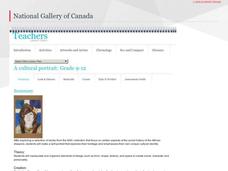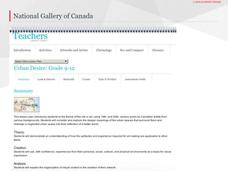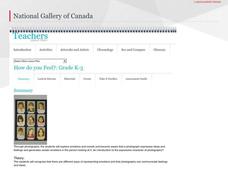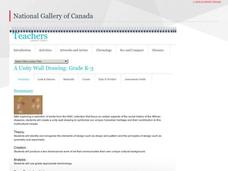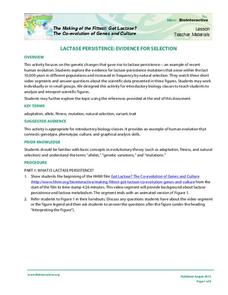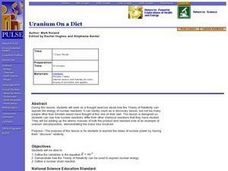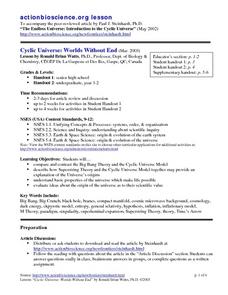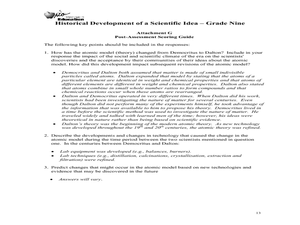Curated OER
True Spin: Music
Upper graders take a critical look at art criticism, music, and politics. They watch one segment of "True Spin," produced by VH1 music television and then discuss myths that relate to art and music. Several modern songs are analyzed...
Curated OER
Range, Cluster, Gap and Outliers
There are a number of activities here where learners collect and record data, as well as, activities where the likelihood of an event happening is calculated given the experimental probability. Young statisticians organize information...
National Gallery of Canada
A Cultural Portrait
Explore heritage and identity through an examination of art and a related project. The featured art, related to the African diaspora, includes several types of art created by different artists. Pupils consider their own backgrounds and...
Curated OER
Man's Search For Meaning: Concept Analysis
Designed as a resource for teachers who use Man's Search for Meaning, this seven-page packet includes a list of related informational texts, research issues and project ideas, central questions, background information on World...
Teach With Movies
Learning Guide to: Schindler's List
Take your history class through Schindler's List with a learning guide, which offers an introduction to the film and a variety of discussion questions and related assignments. There are several useful resources in the...
Curated OER
Ice Cream: a Taste of Science!!
High schoolers define the term solution. They explain conservation of energy and energy transfer as it relate to how the milk solution became ice cream. Students are able to explain freezing point depression.
Curated OER
Genetically Modified Food (GMF)
Explore genetically modified foods through various experiments. In this biology lesson, students discuss the safety issues related to GMF's. They conduct a PCR analysis to identify the presence of genetic modification.
Curated OER
Waves: Sound and Light
A few definitions related to waves open this slide show. Note that the information only covers light waves even though the title mentions sound. Correct the title before using this resource. Another mention is a set of photos of a class...
Curated OER
Fact or Fantasy?
Are we alone in the universe? This brief informational text on extraterrestrial theory has been split into seven sections to help scholars practice note taking. They read the statements, underlining key words. Then, using the graphic...
Alabama Learning Exchange
Bloodstain Pattern Doesn't Lie......
An interesting instructional activity on hypothesizing about the diameter of a drop of blood that is splattered. To test their theories, learners work in groups to make blood droplets splatter from different heights. They use graphed...
National Gallery of Canada
Urban Desire
Urban spaces are often overlooked and broken down. Offer your pupils the opportunity to reimagine an urban space. Learners examine and discuss works of art related to this theme and consider their own communities. Small groups then...
National Gallery of Canada
How Do You Feel?
Photographs can show a range of emotions. Discuss Dorothea Lange's photo Migrant Mother and a range of other images in relation to emotion. After the discussion, class members contribute to a set of photographs that express various...
National Gallery of Canada
Reading Sculptures
Consider the elements and principles of design closely while examining works of art. Learners select an image from the provided pieces to write about in relation to the elements and principles of design. They then sketch and sculpt their...
National Gallery of Canada
A Unity Wall Drawing
Build class community with an art project. Learners first examine and discuss works of art. They then contribute to a class mural by tracing their hands and decorating them in relation to their own cultures. The final mural...
National Gallery of Canada
Tantalizing Tessellations!
Examine repeating and intricate patterns with a study of M.C. Escher and a related art activity. Pupils view and discuss the artwork before creating their own tessellating patterns. Step-by-step instructions for creating a template are...
Council for the Curriculum, Examinations and Assessment
Learning About Learning
Bloom's Taxonomy and Howard Gardner's Theory of Multiple Intelligences feature largely in a session that asks class members to identify their dominate learning style and intelligence. Furthermore, individuals consider how using...
Virginia Department of Education
Elements and Electron Configuration
It's electronic! Pupils uncover elements and their electron configurations as they explore mass, groupings, correct charges, and sliding theory. Young scientists learn creative ways to remember various elements and correctly...
Royal Society of Chemistry
Shapes of Molecules—Geometry of Central Atom
How is a molecule's shape determined? Explore bond angles, lone pairs, and VSEPR theory through a logic-based activity. Chemists pull together information about the major molecular shapes, then use it to solve puzzles.
Howard Hughes Medical Institute
Lactase Persistence: Evidence for Selection
What's the link between lactase persistence and dairy farming? Biology scholars analyze data to find evidence of the connection, then relate this to human adaptation. Working individually and in small groups, learners view short video...
Rice University
Principles of Microeconomics for AP® Courses 2e
An informational textbook covers key principles related to microeconomics, such as consumer behavior and using models to understand economic issues. Young scholars also complete self-check questions at the end of each section to check...
Curated OER
Uranium On a Diet
Students examine how nuclear reactions differ from other chemical reactions they have studied. They add up atomic masses of both the product and reactant side of an example of uranium decomposition, demonstrating mass loss involved.
Curated OER
Introduction to the Cold War
Students explore the correlation between the Cold War and the Domino Theory. In this history lesson, students watch a short video that exhibits the domino effect, then divide into small groups, each representing an assigned...
Curated OER
Cyclic Universe: Worlds Without End
Students compare and contrast the Big Bang Theory and the Cyclic Universe Model. They explain basic properties of the univers which make life possible. They evaluate ideas about the origin of the universe as to their scientific value.
Curated OER
Historical Development of a Scientific Idea
Ninth graders examine how scientist's contribute to atomic theory. For this development of a scientific idea lesson students work in groups and research the development of the atomic model.
Other popular searches
- Science Theory of Relativity
- Special Theory of Relativity
- Theory of Relativity Ppt
- Theory of Relativity Video
- Theory of Relativity Pot




